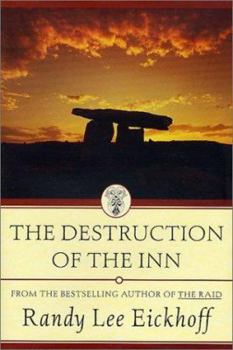Book Overview
Randy Lee Eickhoff continues the Celtic Ulster Cycle; following up his highly acclaimed retelling of The Three Sorrows , with The Destruction of the Inn . Part impacted myth, part heroic saga, and part literary tour de force; this is the tale of a king who dares to ignore the prophecy that foretells his fate. Conaire M?r's reign has ushered in a period of great happiness and good fortune, but his three foster brothers take advantage of his position...
Format:Hardcover
Language:English
ISBN:0312870264
ISBN13:9780312870263
Release Date:April 2001
Publisher:Forge
Length:288 Pages
Weight:0.86 lbs.
Dimensions:0.8" x 5.8" x 8.6"
Customer Reviews
3 ratings
There is no end of thanks...
Published by Thriftbooks.com User , 22 years ago
that one can give Mr. Eickhoff for his scholarly and artistic translations of the books of the Ulster Cycle. These have been as scarce as hen's teeth, but are now here, available to the interested readers. And interesting books these are. If some readers find themselves somewhat confused about the spelling and pronounciation of the Irish names, they should not take it as an obstacle, but but as an encouragement to explore the very rich and beautiful Irish tradition. These books are priceless treasures, and Mr. Eickhoff has done a wonderful thing by translating them. It would be interesting to see if he translates the Fennian cycle.
for fans of Irish historical poetry
Published by Thriftbooks.com User , 22 years ago
Conaire Mor's mother is an elf princess who marries the king of Erin. The altruistic monarch permits his stepson to foster with three sons of loyal warriors. The foursome become quite tight as friends pulling pranks and capers until the monarch dies. Conaire is named king over his three friends. His former buddies resent the anointing of Conaire and abuse the power of being associated with him by ravaging the country. Though he knows he should put them to death, Conaire is averse to harming his childhood friends. Out of control their petty jealousy forces a reluctant Conaire to banish them to Scotland for the good of his subjects. However, the trio joins other looters to continue to plunder Erin with their goal to destroy their former pal. Though well done in performing the difficult task of "translating" an epic poem written during medieval times in "Old Irish" into English, the tale loses some of its imagery and lyrics. Still Randy Lee Eickhoff captures the essence of this insightful poem that focuses on the varying perspectives providing a full look at the same event. Different eyes paint relatively different panoramas. This is a strong transliteration, but it fails to match the easy flow of Seamus Heaney's Beowulf rendition, making THE DESTRUCTION OF THE INN more for fans of Irish historical poetry.Harriet Klausner
Translated From The 11th Century Original
Published by Thriftbooks.com User , 23 years ago
And if that seems a bit fresh the story is believed to have been written in the 8th or 9th Century. The number of, "Countries", that have experienced one or more millennia are fortunate not only to have ancient tales, but also someone who can bring them to modern readers. Randy Lee Eickoff is such a scholar, and he has translated ancient texts from Ireland many times. This is the first work of his I have read, however I certainly intend to search out his previous efforts."Togail Bruidne Da Durga", or, "The Destruction Of The Inn", is a tale of Kings, Queens, their Heirs, deceptions, and battles fought by Knights of mythic stature and powers. It includes the Druidic Priests said to cast spells, not unlike Merlin of Arthurian fame, to effect the outcome of battles. This tale of a King who was warned never to take certain steps, travel a given route, or have contact with various characters is the center of the tale. There is no way to know whether this story was unique when written, or as is more likely, derived from stories told for centuries prior to this version being committed to vellum. And in the reading it really is not an issue, the experience of being able to hear a tale that was related over one millennia ago, a tale that is said to have appeared centuries before Gutenberg's Press, that is what makes this a wonderful read.Apart from the story the Author explains how these old tales took the form they did. How even in their written form, they maintained a structure that would help the stories to be passed verbally with as little change as possible. He is candid about the difficulties in translation, and leaves footnoted blanks rather than attempt to divine a word. The notes are extensive, and it is here among a great deal of material that he offers possible words that may reasonably have filled these spaces. The omissions are very few, I do not want to leave the impression that this is a fragmented read it is quite the opposite.There were aspects of the tale that sadly exist to this day. I believe them to be a comment on human nature as a whole, and not restricted to those people and nations represented in this book. The fact that the battle involved Irish fighting Irish and that of the British fighting Irish brings the reader up short. It is not only sad, it is a reminder of how old grievances can be, and how they seem to be among the few human actions that are truly perpetual. It is not an issue of repeating the past, rather the question of how long it will persist.An unqualified recommended read.






